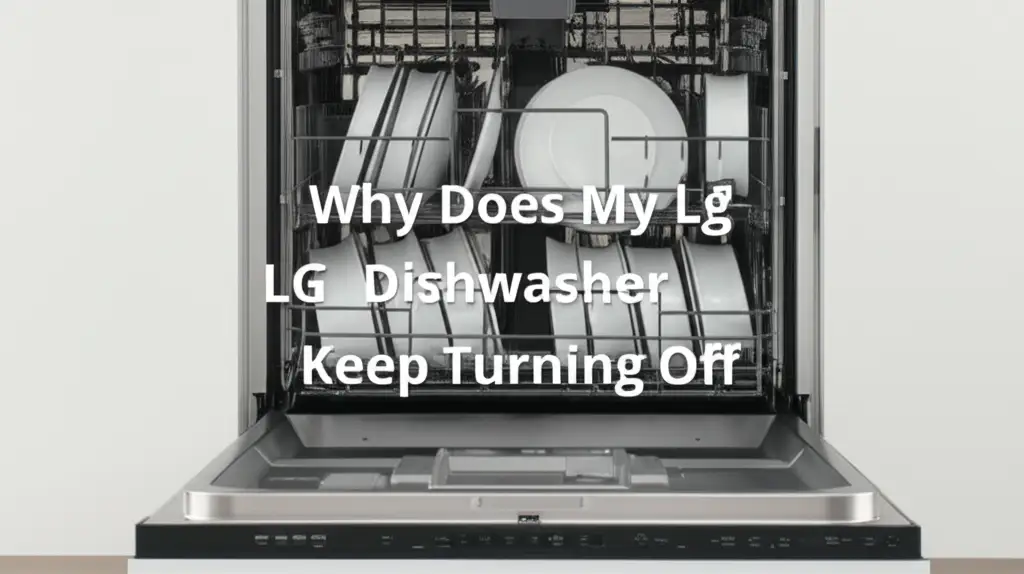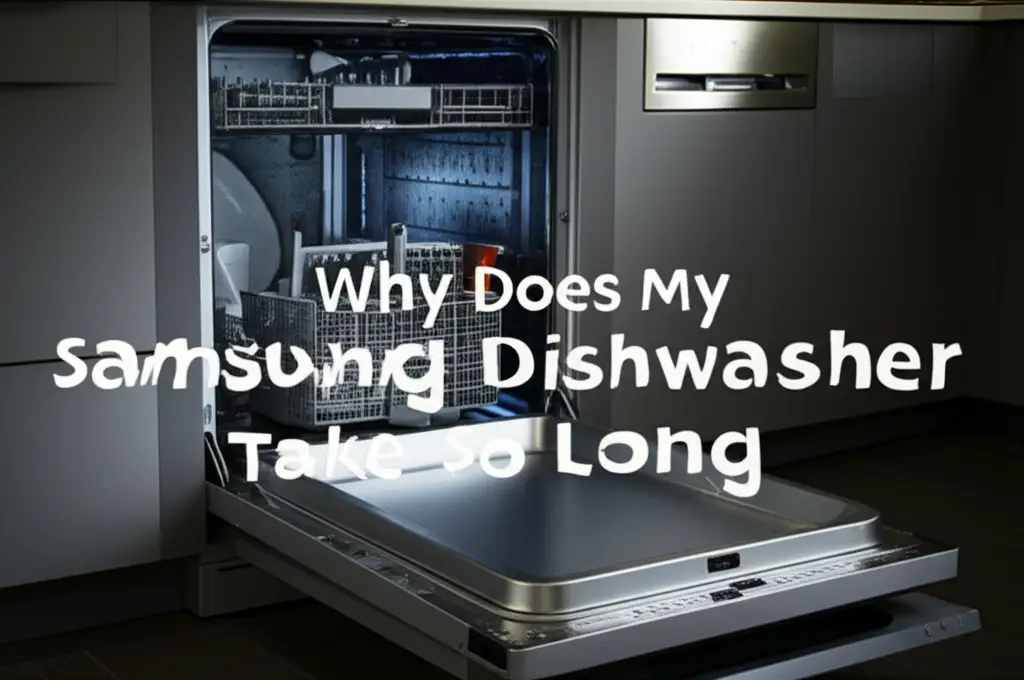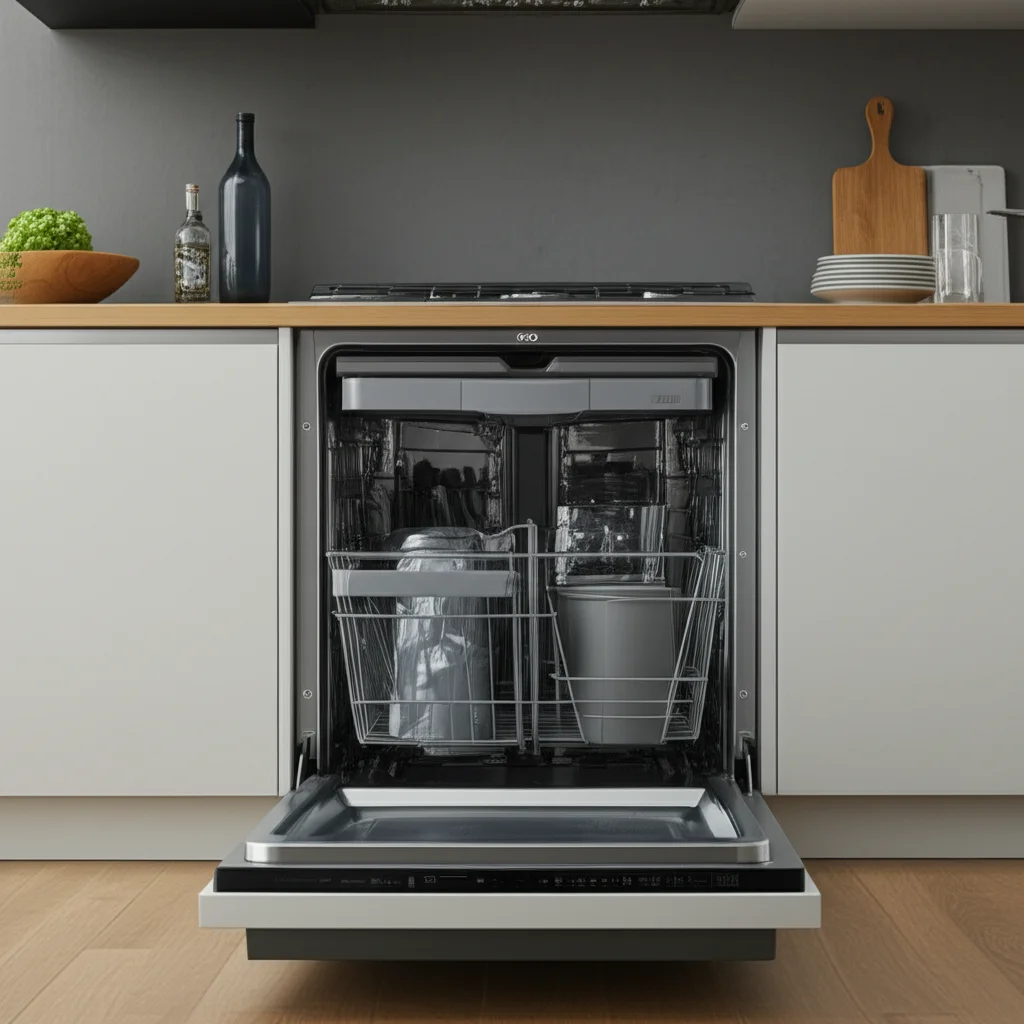· Todd Martin · Home Appliances · 22 min read
Why Does My Lg Dishwasher Keep Turning Off

LG Dishwasher Turning Off? Get Solutions Now!
Imagine this: you load your LG dishwasher, start a cycle, and walk away, expecting sparkling dishes. But then, you return to silence. Your LG dishwasher keeps turning off unexpectedly. This can be frustrating, especially when you have a mountain of dishes waiting. You might wonder what went wrong and how to fix it.
I know how annoying it is when your reliable appliance acts up. This common issue often points to a few typical culprits. Understanding these problems helps you find a quick fix. We will explore common reasons why your LG dishwasher keeps turning off. This article guides you through troubleshooting steps. You can often solve these issues yourself.
Takeaway
- Check power connections and circuit breakers first.
- Ensure the door latch closes properly.
- Inspect water supply and drain hoses for blockages.
- Look for signs of overheating or thermal fuse issues.
- Consider issues with the control board or motor if other checks fail.
Clear Answer
Your LG dishwasher keeps turning off due to various issues. Common causes include unstable power supply, a faulty door latch, blockages in water lines, overheating, or a malfunctioning control board. Identifying the specific problem helps in resolving it effectively.
Understanding Why Your LG Dishwasher Stops
It is a mystery when your LG dishwasher suddenly stops running. Many factors can cause this. The machine might pause mid-cycle or turn off completely. Understanding the cause helps you fix it. I often see people overlook simple things first.
This could be a power issue, or something internal. Dishwashers have safety features. These features can shut down the machine to prevent damage. We should check these systems. This section covers the general reasons for unexpected shutdowns.
- Safety Shutdowns: Your LG dishwasher has built-in safety mechanisms. It might turn off to prevent overheating. It can also stop if it detects a leak. These are protective measures.
- Program Interruptions: Sometimes, a cycle gets interrupted. This can happen due to a momentary power fluctuation. It can also be caused by someone opening the door. The machine then stops running.
- Component Failure: Over time, parts wear out. A sensor might fail. A pump could struggle. This can lead to the machine shutting down unexpectedly. We will look at specific components later.
Before diving into complex diagnostics, always check the basics. Is the power cord fully plugged in? Did the circuit breaker trip? Sometimes, the simplest solution is the correct one. This initial check saves time and effort. It helps rule out obvious problems quickly.
Common Electrical Issues Affecting LG Dishwashers
Electrical problems are a leading cause of your LG dishwasher turning off. The dishwasher needs a steady power supply. Any interruption can cause it to stop running. This could be a house wiring issue. It might also be a problem with the dishwasher’s internal electrical components.
I always suggest starting here. It is often the easiest thing to check. You can quickly identify external electrical faults. This saves you from tearing apart your machine.
Power Outlet or Cord Problems
First, check the power cord. Make sure it is securely plugged into the wall outlet. A loose connection can cause intermittent power. This makes your LG dishwasher stop running. I have seen this many times.
Next, test the outlet itself. Plug another appliance into the same outlet. See if it works fine. If the other appliance does not work, the outlet may be faulty. You might need an electrician to inspect it. Sometimes, an outlet simply loses power.
Tripped Circuit Breaker
Dishwashers draw a lot of power. This can sometimes overload a circuit. When this happens, the circuit breaker trips. The breaker cuts power to prevent damage. This is a common reason why your LG dishwasher keeps turning off.
Go to your home’s main electrical panel. Look for a tripped breaker. It will be in the “off” or middle position. Flip it firmly to “off,” then back to “on.” If it trips again, there might be a more serious electrical issue. This needs professional attention. You can learn more about general appliance power issues, such as why your LG washing machine keeps turning off. For general appliance issues with power, you may also check why your LG dishwasher is not turning on.
Faulty Internal Wiring
Inside the dishwasher, wires can become loose or damaged. Vibrations from regular use can cause this. Pests might also chew through wires. Loose wires can cause power interruptions. They can also create safety hazards.
If you suspect internal wiring issues, unplug the dishwasher immediately. Do not attempt to fix this yourself unless you have electrical experience. It is safer to call a qualified technician. They can safely inspect and repair internal wiring.
Addressing Water Supply and Drainage Problems
Water flow is crucial for any dishwasher. If your LG dishwasher keeps turning off, it might be due to water issues. Problems with water entering or leaving the machine can cause a shutdown. The dishwasher’s sensors detect abnormal water levels. These sensors then trigger a safety shutdown.
I always advise checking both ends of the water process. Both the water inlet and the drain system are important. A smooth flow in and out is essential for proper operation.
Insufficient Water Supply
The dishwasher needs enough water to run a cycle. If water pressure is too low, the dishwasher might stop. Check the water supply valve behind the dishwasher. Ensure it is fully open. You can also check your home’s main water supply.
- Kinked Water Inlet Hose: The hose connecting your dishwasher to the water supply can get kinked. This restricts water flow. Straighten any kinks you find.
- Clogged Inlet Screen: A small screen filters debris from the water entering the dishwasher. This screen can get clogged over time. Turn off the water supply and disconnect the hose. Clean the screen carefully.
- Faulty Water Inlet Valve: This valve controls water entry. If it fails, the dishwasher won’t get water. It might shut down. You usually need to replace this part if it’s faulty.
Drainage Issues and Blockages
Proper drainage is just as important as water supply. If water cannot drain, the dishwasher might stop. It prevents overflowing or damage. A clogged drain line is a common culprit. If your LG dishwasher has water in the bottom, it often signals a drain issue. This problem can also lead to the machine turning off.
- Clogged Drain Hose: Food particles and grease can build up in the drain hose. This blocks water from exiting. Disconnect the drain hose from the sink drain or garbage disposal. Check for blockages.
- Garbage Disposal Connection: If your drain hose connects to a garbage disposal, ensure the knock-out plug is removed. This is a common oversight during installation. Also, check the disposal for any clogs. Run the disposal before starting the dishwasher.
- Drain Pump Malfunction: The drain pump pushes water out of the dishwasher. If it is faulty or obstructed, water will not drain. The dishwasher will detect this. It then turns off. You might hear strange noises from the pump if it is struggling. Sometimes, debris gets stuck in the pump impeller. For more details on drainage issues, you can check why your LG dishwasher has water in the bottom.
Overheating and Thermal Fuse Protection
Dishwashers can overheat during operation. This is especially true if there’s a problem with the motor or a blockage. Your LG dishwasher has safety features. These features prevent damage from excessive heat. A common safety device is the thermal fuse.
I have seen many appliances shut down due to overheating. It is a protective measure. When the temperature inside the dishwasher rises too high, the thermal fuse trips. This cuts power to the unit.
Understanding the Thermal Fuse
The thermal fuse is a safety component. It is a one-time safety device. It blows when a certain temperature is reached. This protects the dishwasher from damage. Once it blows, it needs replacement. You cannot reset it.
- Location: The thermal fuse is usually near the control board or heating element. You might need to remove the outer door panel to access it. Always disconnect power first.
- Testing: You can test a thermal fuse with a multimeter. A working fuse will show continuity. A blown fuse will show no continuity. If it has no continuity, it needs to be replaced.
- Root Cause: A blown thermal fuse often indicates an underlying issue. The fuse blew for a reason. Common reasons include a faulty wash motor, a restricted pump, or a defective heating element. Address the root cause. Otherwise, the new fuse will likely blow again.
Causes of Overheating
Several issues can lead to your LG dishwasher overheating. These problems put extra strain on components. This increases heat production.
- Motor Overload: If the wash motor works too hard, it generates excess heat. This can happen if the pump is clogged. It can also occur if something jams the impeller.
- Blocked Vents: Dishwashers have vents for air circulation. If these vents are blocked, heat can build up inside. Ensure the dishwasher has enough space around it for airflow.
- Faulty Heating Element: The heating element warms the water. If it malfunctions, it might continuously heat. This causes extreme temperatures. A defective heating element can also draw too much power. This leads to overheating.
- Sudsy Water: Too much soap or detergent can create excessive suds. This makes the motor work harder. The motor then generates more heat. Always use the recommended amount of detergent. Use only dishwasher-specific detergent.
If your LG dishwasher keeps turning off due to overheating, always address the core problem. Replacing the thermal fuse without fixing the cause will only provide a temporary solution. Consult the dishwasher’s manual for specific thermal fuse locations and replacement procedures.
Faulty Door Latch and Control Board Glitches
Two critical components ensure your LG dishwasher operates safely and correctly: the door latch and the control board. A problem with either of these can cause your dishwasher to turn off unexpectedly. These parts are essential for the appliance’s basic functionality.
I’ve seen many cases where a simple door issue causes major headaches. The control board, on the other hand, is the brain of the machine. Any glitch there can lead to all sorts of strange behavior.
Defective Door Latch Assembly
The door latch does more than just keep the door closed. It also contains a door switch. This switch signals to the control board that the door is securely shut. The dishwasher cannot start or continue a cycle if the switch doesn’t register the door as closed.
- Loose or Misaligned Door: Check if the dishwasher door closes completely. Sometimes, the latch simply isn’t engaging properly. Adjust the door alignment if needed.
- Worn Latch Mechanism: Over time, the plastic or metal components of the latch can wear out. This prevents the latch from holding the door firmly. The door might pop open during a cycle. This causes the machine to stop.
- Faulty Door Switch: The switch within the latch assembly can fail. It might not send the “door closed” signal even when the door is shut. You can test this switch with a multimeter for continuity. If it’s faulty, the entire door latch assembly often needs replacement.
Malfunctioning Control Board (Main PCB)
The control board is the central processing unit of your LG dishwasher. It manages all functions, from water intake to cycle progression. A glitch or fault in this board can lead to erratic behavior, including unexpected shutdowns.
- Power Surges: Power surges can damage delicate electronic components on the control board. This can cause the board to malfunction. It might lead to intermittent shutdowns.
- Software Glitches: Like any computer, the control board has software. Sometimes, a software glitch can occur. This might cause the dishwasher to freeze or shut down. A hard reset (unplugging the dishwasher for a few minutes) can sometimes resolve this.
- Physical Damage or Wear: Components on the control board can wear out. Water leaks can also cause damage to the board. Look for burn marks or corrosion on the board. These indicate a problem.
- Error Codes: A malfunctioning control board often displays error codes. Check your LG dishwasher manual to understand what these codes mean. They can point to the specific fault. If the control board is genuinely faulty, it usually requires professional replacement. This part can be expensive.
Both the door latch and the control board are vital for safe and proper operation. Always ensure the door is securely latched before starting a cycle. If issues persist, consider troubleshooting these components.
Motor and Pump Malfunctions
The motor and pumps are the workhorses of your LG dishwasher. They are responsible for circulating water and draining it. If either of these components malfunctions, your LG dishwasher keeps turning off. This is often a safety response to prevent further damage.
I often think of these as the muscles of the machine. When the muscles fail, the whole system struggles or stops. Identifying problems here usually involves listening for unusual noises or observing water movement.
Wash Motor (Circulation Pump) Issues
The wash motor, also known as the circulation pump, pushes water through the spray arms. This creates the jets that clean your dishes. If this motor struggles or fails, it affects the entire washing process.
- Overheating: A worn or overloaded motor can overheat. As discussed before, this triggers the thermal fuse. The dishwasher then shuts down to protect itself.
- Blockages: Food particles or debris can get lodged in the motor’s impeller. This makes the motor work harder. It can also cause it to seize. You might hear a humming sound if the motor is trying to run but can’t.
- Worn Bearings: Over time, the motor’s bearings can wear out. This causes friction and excessive noise. The motor might draw too much power. This could lead to a shutdown.
- Electrical Faults: The motor itself can have internal electrical faults. These can cause it to short circuit or draw inconsistent power. This will make the dishwasher stop.
Drain Pump Malfunction
The drain pump expels dirty water from the dishwasher. If it cannot do its job, water remains in the tub. This causes the dishwasher to stop. It prevents flooding and ensures proper rinsing.
- Obstruction: Just like the wash motor, the drain pump can get clogged. Small bones, glass shards, or food debris can block the impeller. This prevents water from draining.
- Electrical Failure: The drain pump motor can also fail electrically. It might not receive power. Or, it could have an internal winding issue. This prevents it from running.
- Continuity Check: You can test the drain pump’s continuity with a multimeter. This helps determine if the pump is receiving power and if its internal windings are intact. If there’s no continuity, the pump is likely faulty.
When troubleshooting motor or pump issues, always disconnect power first. Inspect for visible obstructions. Listen for unusual noises during operation. A grinding or loud humming sound often indicates a motor or pump struggling. If you suspect a motor or pump issue, professional diagnosis and repair are often needed. These parts are complex and require careful handling.
Sensor Errors and Diagnostic Codes
Modern LG dishwashers are equipped with various sensors. These sensors monitor different aspects of the wash cycle. They report data to the control board. If a sensor fails or provides incorrect readings, the control board might incorrectly interpret a problem. This can cause your LG dishwasher to turn off.
I rely on these sensors for diagnostic clues. When an appliance acts strangely, the sensors often hold the answer. Many dishwashers display error codes when a sensor issue arises.
Understanding Common Sensors
Several types of sensors are typically found in an LG dishwasher:
- Water Level Sensor: This sensor detects if there is enough water in the tub. If it senses too little water, the dishwasher might stop filling. If it senses too much, it might trigger a drain cycle or shut down to prevent overflow.
- Temperature Sensor (Thermistor): This sensor monitors the water temperature. It ensures the water heats to the correct level for effective cleaning. If the sensor is faulty, the dishwasher might overheat or not heat at all. Both can cause shutdowns.
- Turbidity Sensor (Water Cleanliness): Some advanced models have a turbidity sensor. It measures how dirty the water is. This helps determine if more rinsing is needed. A faulty turbidity sensor might cause the dishwasher to run longer or stop prematurely.
- Leak Sensor (Flood Prevention Switch): Many dishwashers have a pan at the bottom with a leak sensor. If water collects in this pan, the sensor trips. It activates the drain pump and shuts off the dishwasher. This prevents a major flood.
Decoding Error Codes
When a sensor or another component malfunctions, your LG dishwasher often displays an error code on its digital screen. This is a very helpful diagnostic tool.
- Consult Your Manual: Always refer to your LG dishwasher owner’s manual first. It lists all error codes specific to your model. The manual explains what each code means. It also provides basic troubleshooting steps.
- Common Codes Indicating Shutdowns:
- IE (Inlet Error): Often indicates a water supply issue. This can lead to the machine stopping if it can’t fill.
- OE (Outlet Error): Usually points to a drainage problem. The dishwasher will stop if water can’t drain.
- LE (Leak Error): Activated by the leak sensor. The dishwasher will stop and drain if a leak is detected.
- FE (Overflow Error): Similar to LE, indicates too much water in the tub.
- HE (Heating Error): Relates to the heating element or temperature sensor. Overheating can cause shutdowns.
- Resetting the Dishwasher: Sometimes, a temporary sensor glitch can occur. Try resetting your LG dishwasher. Turn off the power at the circuit breaker for a few minutes. Then, turn it back on. This can clear temporary error codes.
- Professional Help: If an error code persists after a reset, or if you cannot find the code in your manual, a technician is usually needed. They have diagnostic tools to pinpoint sensor failures accurately.
Understanding and addressing sensor errors is key to keeping your LG dishwasher running smoothly. These small components play a big role in overall machine function.
What to Do When Your LG Dishwasher Keeps Turning Off: Step-by-Step Troubleshooting
When your LG dishwasher keeps turning off, it can feel overwhelming. But by following a systematic approach, you can often identify and fix the issue. I like to start with the simplest checks and move to more complex ones. Safety is always the top priority.
Always ensure the dishwasher is unplugged or the circuit breaker is off before performing any internal checks. This prevents electrical shock.
Check Power Supply and Connections:
- Verify Outlet: Plug another appliance into the dishwasher’s outlet. Ensure the outlet has power.
- Inspect Cord: Check that the dishwasher’s power cord is firmly plugged into the wall. Look for any visible damage to the cord.
- Reset Breaker: Go to your home’s electrical panel. Locate the circuit breaker for the kitchen or dishwasher. Flip it completely off, then back on. Wait a few minutes before trying the dishwasher again. If you have other LG appliances experiencing power issues, you might find some troubleshooting tips here: Why your LG washing machine keeps turning off.
Inspect the Door Latch:
- Close Firmly: Make sure the dishwasher door clicks shut completely. Push it firmly.
- Check Alignment: Look for any signs of the door being misaligned or sagging. Adjust the hinges if possible, or consult your manual.
- Test Latch Mechanism: Try opening and closing the door several times. Does the latch feel sturdy? If it feels loose or broken, it might need replacement.
Examine Water Supply and Drainage:
- Water Inlet Valve: Ensure the water supply valve to the dishwasher is fully open. It’s usually under the sink.
- Inlet Hose: Check for kinks or blockages in the water inlet hose. Straighten it if needed.
- Drain Hose: Look for kinks or clogs in the drain hose. This hose usually connects to the sink drain or garbage disposal.
- Garbage Disposal: If connected to a disposal, run the disposal before the dishwasher cycle. Ensure the knock-out plug is removed if it’s a new installation. If you are having issues with water remaining in the bottom of your dishwasher, which can cause it to turn off, check out this guide: Why your LG dishwasher has water in the bottom.
Look for Signs of Overheating:
- Feel the Dishwasher: Does the exterior feel excessively hot to the touch during a cycle? This might indicate overheating.
- Check for Blockages: Clear any food debris from the filter and spray arms. A clogged filter makes the motor work harder and can cause overheating.
- Thermal Fuse: If you’re comfortable, and after disconnecting power, you can locate and test the thermal fuse for continuity with a multimeter. If it’s blown, it needs replacement, but remember to find the root cause.
Observe Error Codes:
- Digital Display: Does your LG dishwasher display any letters or numbers on the control panel before it turns off?
- Consult Manual: Look up any displayed error codes in your owner’s manual. The manual provides specific meanings and troubleshooting steps. These codes are invaluable for diagnosing problems.
Consider Professional Help:
- If you have gone through all these steps and your LG dishwasher still keeps turning off, it might be time to call a professional appliance technician.
- Issues with the control board, main wash motor, or drain pump often require specialized tools and expertise to diagnose and repair. Do not attempt complex electrical repairs yourself unless you are qualified.
By following these steps, you can methodically troubleshoot why your LG dishwasher is stopping. This approach helps you either fix the problem or provide valuable information to a repair technician.
When to Call a Professional for Your LG Dishwasher
Troubleshooting your LG dishwasher can save you money. However, some issues are beyond simple DIY fixes. Knowing when to call a professional is important. It ensures your safety and prevents further damage to the appliance.
I always advise caution. If you are uncomfortable with a step, or if the problem seems too complex, do not hesitate to seek expert help.
- Persistent Electrical Issues: If your circuit breaker trips repeatedly, even after resetting, do not ignore it. This indicates a serious electrical fault in the dishwasher or your home’s wiring. An electrician or appliance technician should investigate immediately. Electrical hazards are dangerous.
- Control Board Malfunctions: Replacing a control board is complex. It involves careful handling of delicate electronics. Incorrect installation can cause more damage. If you suspect a faulty control board, a professional technician is best. They have the diagnostic tools and experience for this repair.
- Motor or Pump Failure: The wash motor and drain pump are major components. Replacing them requires disassembly of the dishwasher. It often involves specialized tools. If you have confirmed a motor or pump failure, a technician can perform the repair safely and effectively.
- No Visible Cause After Basic Checks: You have checked all the basic things. You confirmed power, water, drainage, and door latch. There are no error codes, but your LG dishwasher still keeps turning off. This suggests a hidden or intermittent issue. A professional can use advanced diagnostic equipment. They can identify the root cause that you might miss.
- Under Warranty: If your LG dishwasher is still under warranty, attempts at DIY repair might void it. Check your warranty terms. It is often best to contact LG customer support or an authorized service center. They can provide covered repairs.
- Safety Concerns: Any repair involving water and electricity carries risks. If you are unsure about any step, or if you feel unsafe, stop. Call a qualified professional. Your safety is paramount.
Calling a professional might seem like an added cost. But it can save you money in the long run. They can prevent incorrect repairs that lead to more expensive damage. They also ensure the repair is done safely and correctly the first time.
FAQ Section
Q1: Why does my LG dishwasher turn off randomly mid-cycle? A: Random shutdowns mid-cycle often point to a safety feature activation. This could be due to a faulty door latch, an overheating motor, or a sudden power fluctuation. Sensors detecting issues like low water pressure or drain blockages can also trigger a mid-cycle stop. Check your power supply and inspect for any error codes.
Q2: Can an overloaded LG dishwasher cause it to turn off? A: Yes, an overloaded LG dishwasher can cause it to turn off. Too many dishes block spray arms or strain the motor. This can lead to overheating or inefficient water circulation. The dishwasher’s safety features might then shut down the cycle to prevent damage from excessive strain or heat build-up.
Q3: How do I reset my LG dishwasher that keeps turning off? A: To reset your LG dishwasher, first, turn it off using the power button. Then, go to your home’s electrical panel and flip the circuit breaker connected to the dishwasher to the “off” position. Wait for about 5-10 minutes. Finally, flip the breaker back to “on” and try starting the dishwasher again.
Q4: Is it safe if my LG dishwasher keeps turning off? A: Your LG dishwasher turning off is usually a safety mechanism. It protects the appliance from damage. However, repeated shutdowns can indicate an underlying issue like electrical faults or overheating. While the immediate shutdown is safe, the root cause might pose risks if not addressed. Have it checked if it happens often.
Q5: What does the LE error code mean on my LG dishwasher? A: The LE error code on an LG dishwasher typically indicates a leakage error. This means the dishwasher’s leak sensor has detected water in the base pan. When this sensor trips, the dishwasher automatically turns off to prevent flooding. You should inspect for any leaks under or around the appliance.
Q6: Can low water pressure cause my LG dishwasher to turn off? A: Yes, low water pressure can cause your LG dishwasher to turn off. The dishwasher needs a certain amount of water pressure to fill properly and operate its spray arms effectively. If the water intake sensor detects insufficient pressure or flow, the control board may pause or stop the cycle as a safety measure.
Conclusion
When your LG dishwasher keeps turning off, it disrupts your daily routine. This problem can stem from simple issues like power supply interruptions or a misaligned door latch. It can also indicate more complex internal problems. These might include drainage blockages, overheating components, or a malfunctioning control board.
I hope this guide helps you identify the cause. By systematically checking common culprits, you can often resolve the issue yourself. Remember to always prioritize safety when troubleshooting appliances. If you encounter persistent electrical issues or feel uncomfortable with complex repairs, calling a qualified professional is the best course of action. They have the expertise to diagnose and fix the problem safely. Your LG dishwasher is a valuable appliance. Getting it back to optimal performance means peace of mind and clean dishes. Take action today to get your LG dishwasher running smoothly again.
- LG Dishwasher
- Dishwasher Troubleshooting
- Appliance Repair
- LG Appliance Issues
- Power Problems





